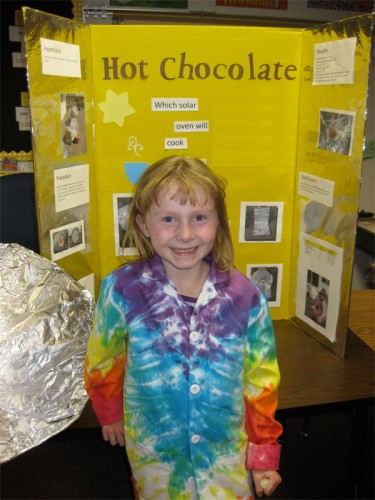Science Fair Planning and Creative Ideas
By Guest Blogger: Karen Bantuveris, VolunteerSpot
 Mad Science Meets Crazy Easy Student Science Fair Planning
Mad Science Meets Crazy Easy Student Science Fair Planning
Building extravagant dioramas and goo filled volcano models is only half the battle for creating a successful science fair. There’s a lot of work that goes into coordinating and planning this staple of elementary school life, and this post is dedicated to making it an easily navigable event for kids, parents and teachers.
Putting on a science fair can seem like quite the impossible task for both teachers and parent volunteers alike, but with advanced planning, a little creativity and a lot of enthusiasm, a science fair can be a whole bunch of fun for everyone involved.
Planning and Promoting
- Decide where and when the science fair will be held, and when the deadline for the projects will be. The cafeteria and the gym both provide open space where tables can be set up and people can easily walk around. Open the fair during the school day and encourage teachers from non-participating classes to bring their students!
- Help students come up with topics, talk to your science teachers and find local research universities. Put together a giant list of science fair projects. A resource like Steve Spangler Science is perfect because there are oodles of ideas, and even better, there are hard to come by supplies!
- Get the kids excited by offering creative awards for the projects deemed: messiest, stinkiest, loudest, smallest, biggest… get the kids thinking outside the ‘normal’ same old projects!
Volunteers
A large event like this needs a lot of support, from parents, kids and teachers. Make sure to get everyone on board a few weeks ahead of time using online signup sheets; busy schedules can fill up super-fast! Have parent helpers come for one-hour shifts during the day, and stagger set up times for the kids so there isn’t mass chaos as everyone tries to set up their projects at the same time.
You may also opt to have outside judges from the community – be sure to ask people from several scientific areas: engineers, doctors, and fish and game specialists. Ask around to see if any school parents fit the bill. Once invited, add them to your VolunteerSpot.com FREE Sign up reminder system.
Event Extras
- Keep repair items on hand, just in case someone needs a last minute piece of duct tape, or a touchup with a Sharpie.
- If the kids are presenting their projects to the judges, keep a detailed schedule of who’s going when and who will be judging who.
- Take this opportunity to add a lesson plan on public speaking for the students that will be presenting their project to the judges.
- Once the science fair is finished, have volunteers and judges fill out an evaluation form that outlines their feelings on the successfulness of the event, to help make the next year even more successful.
Prizing
The last thing to consider is how many prizes, what kind of prizes and what guidelines there will be for prizes handed out. Will there be an award for everyone who participates? Or will you have the traditional gold, silver and bronze awards? Will prizes be based on grade level, but have an overall winner for the school? What does a successful science fair mean for your school?
Here’s to an exciting and super successful science fair!
About the author:
 Karen Bantuveris is the founder & CEO of VolunteerSpot, a time and sanity-saving online coordination tool that empowers busy parents, teachers and grassroots community leaders by making it easier get involved. VolunteerSpot’s free online sign up sheets are perfect for organizing a school or community science fair. Karen is passionate about increasing parent participation in schools and lives in Austin, TX with her husband and daughter.
Karen Bantuveris is the founder & CEO of VolunteerSpot, a time and sanity-saving online coordination tool that empowers busy parents, teachers and grassroots community leaders by making it easier get involved. VolunteerSpot’s free online sign up sheets are perfect for organizing a school or community science fair. Karen is passionate about increasing parent participation in schools and lives in Austin, TX with her husband and daughter.




Karen – thank you for some great ideas for planning science fair. I am planning my daughter’s science fair this year. We don’t do awards, but I love the idea of awarding messiest, most creative, loudest, etc. I also am thankful for your tips of what to have on you during the fair. Sharpies are always in high demand. I’m going to schedule my volunteers in shifts so we stay organized. Thanks again.
Ahhh The Science Fair! We have a couple great ideas for this year! I love the tips here for organizing a science fair!!
We are thinking about doing an experiment with all the soda fountains around town, testing the ‘diet’ sodas to see if they have sugar in them for whatever reason. Using diabetic test strips. (we have a theory that a large percentage of soda machines are hooked up wrong… and people who might be diabetic could have a real problem with that!)
Thanks, Susan and Carissa!
Sharpies and Duct Tape – must-haves for sure! This year our school is incorporating Science Day with the 5th grade Science Fair – All kids K-5 will get a chance to attend their choice of 4 hands-on sessions led by community leaders and parents. Exciting!
When fun activities for the kids are planned out, the day just seems
to run smoother and is more relaxing for everyone involved.
For instance, playgroups can have a day dedicated to the letter C
wherein each child can dress up and bring an item which starts with that particular letter.
Fold them all up and place them in a bowl, and then take
turns drawing out one at a time and acting them out for all to guess.
All it takes is a little family planning, creativity, and imagination for
fun games. Give them free rein to decorate about 20 plain cakes with coloured icing, sprinkles and chopped strawberries.